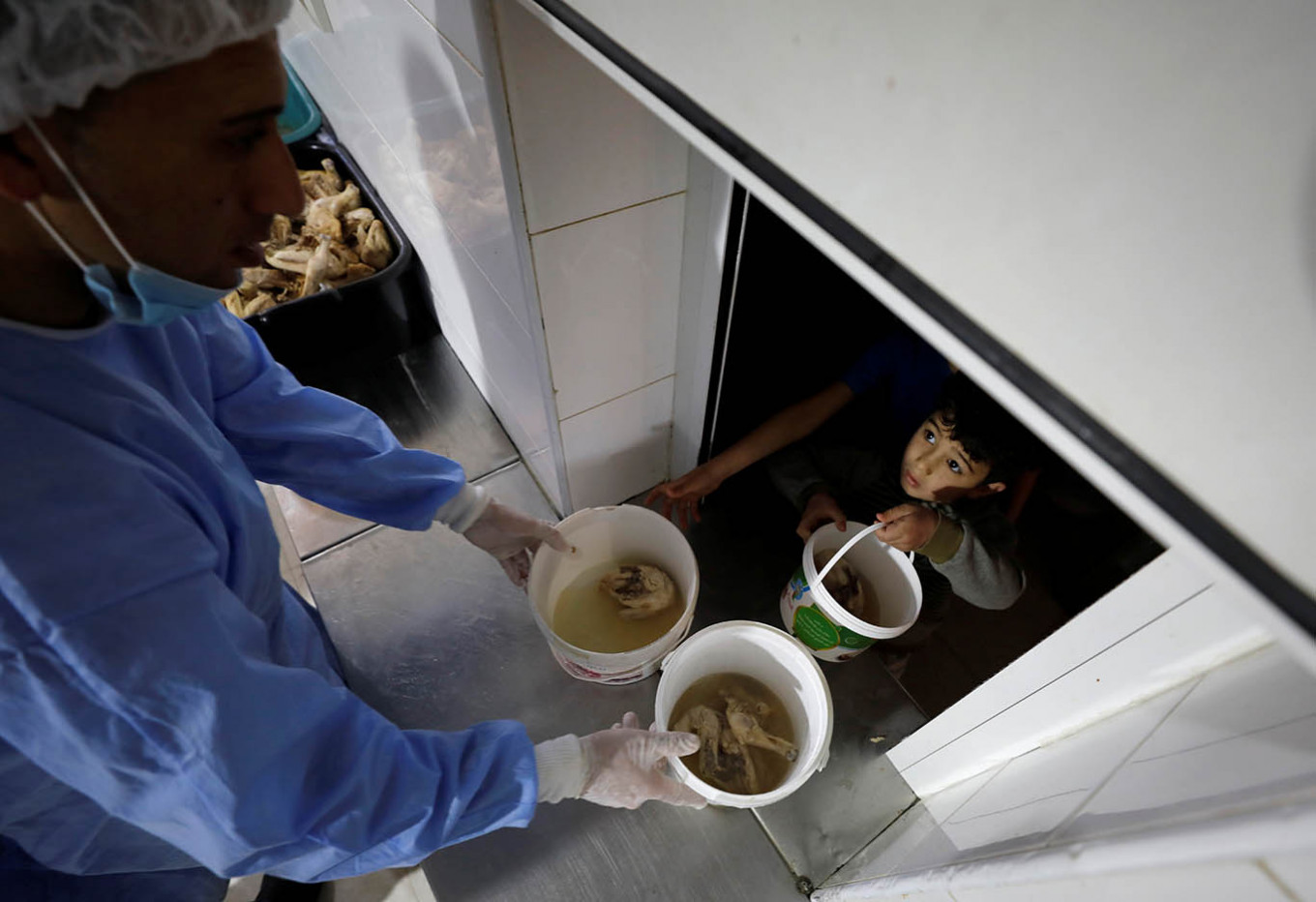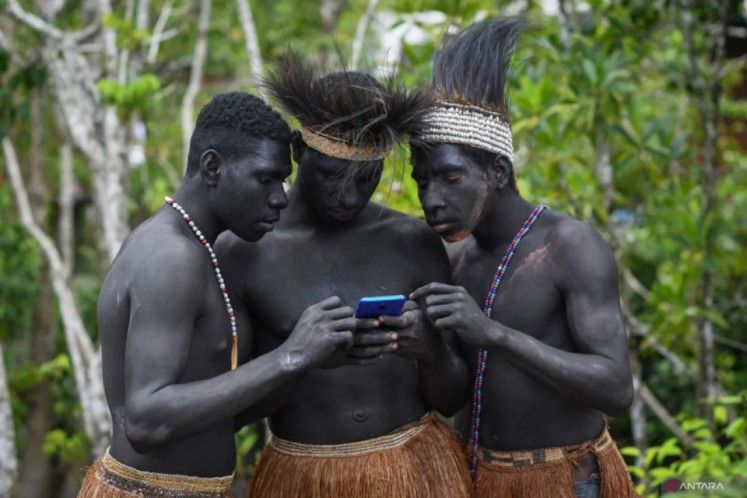Popular Reads
Top Results
Can't find what you're looking for?
View all search resultsPopular Reads
Top Results
Can't find what you're looking for?
View all search resultsKeep up generosity beyond Ramadan
Indonesia, as the country with the world’s largest Muslim population, has been among the 10 most generous nations over 10 years. Interestingly, Indonesia is the only country in the top 10 to have improved its scores over recent years, with the others on a downward trajectory. The report suggests this trend relates to the Islamic practice of traditional redistribution, namely zakat (alms), which also supports efforts to achieve the Sustainable Development Goals (SDGs).
Change text size
Gift Premium Articles
to Anyone
 A Palestinian boy receives free Iftar (breaking fast) meals at a charity kitchen known as 'Prophet Ibrahim's Takiyya' during the holy month of Ramadan, amid concerns about the spread of the coronavirus disease (COVID-19) in Hebron, in the Israeli-occupied West Bank May 5, 2020. (REUTERS/Mussa Qawasma)
A Palestinian boy receives free Iftar (breaking fast) meals at a charity kitchen known as 'Prophet Ibrahim's Takiyya' during the holy month of Ramadan, amid concerns about the spread of the coronavirus disease (COVID-19) in Hebron, in the Israeli-occupied West Bank May 5, 2020. (REUTERS/Mussa Qawasma)
T
he World Giving Index 2019 issued a special edition “Ten years of giving trends” to provide insight into the scope and nature of giving around the world over the last 10 years with around 1.3 million respondents. Giving was defined in three forms: helping a stranger, donating money and time volunteered in an organization. Of the 128 countries surveyed, the top 10 world’s highest generous countries over a decade represent diverse geographies, religions, cultures and levels of wealth. The top performing countries are the United States, New Zealand, Ireland, United Kingdom, Sri Lanka, Myanmar, Australia, Canada, Netherlands and Indonesia. While seven of the top 10 countries are among the wealthiest in the word, Sri Lanka, Myanmar and Indonesia are all grouped by the United Nations as lower-middle-income countries.
However, China, as the world’s second largest economy accounting for 16 percent of the global economy, has the lowest score in the index, ranked at 126. This simply indicates that generosity does not positively corelate with levels of prosperity.
In the western world, generosity is commonly linked to the term philanthropy. The term refers to charitable giving undertaken by an individual or organization for social welfare. In 2010, Bill Gates and Warren Buffet as world’s wealthiest figures initiated “The Giving Pledge” to convince their billionaire peers to devote more than half of their fortunes to philanthropy.
As of 2014, the US was noted as the most philanthropic nation. Since the late 19th century, philanthropy has been a major source of funding for religion, medicine and health care, the arts, and educational institutions. In 1983, Daniel A. Wren, a professor of business administration, argued that the expansion of business enterprises in 19th century America had encouraged business philanthropy to play a substantial role in higher education.
Harvard University, established in 1638, was philanthropically sponsored by John Harvard’s estates. The Global Philanthropy Report in 2017 documented that philanthropic institutions were highly concentrated in Europe, home to almost 60 percent of such institutions. This shows that voluntary giving has transformed into organizational institutions for wider social welfare impacts.
In the western world, particularly in the US, successful crowdfunding platforms have emerged based on donations and rewards to channel philanthropic participation, to help fund innovative and creative projects. Kickstarter, hosted in the US, is among the world’s most successful crowdfunding platforms. Technological development facilitates philanthropic participation for wider social and economic impacts.
Several studies indicate that modern philanthropy in the western world is rooted in religious traditions. The modern notion of philanthropy in the UK started to develop in the mid-1500s, shaped by Protestant teachings according to Rhodri Davies. Thus, the secular concept of modern western philanthropy has strong religious roots.
While the above World Giving Index 2019 shows the phenomenon of secular philanthropy among the wealthiest countries, less affluent countries like Sri Lanka, Myanmar and Indonesia, show the large influence of religious institutions on philanthropic behavior. Sri Lanka and Myanmar have a large population of Theravada Buddhists. Dana, which refers to generosity, is a value system promoted by Buddhism that is considered by the report to have made a significant contribution to both countries’ historically high scores in the Index. Generosity and service to others have central importance in Theravada Buddhism, scholars note.
Indonesia, as the country with the world’s largest Muslim population, has been among the 10 most generous nations over 10 years. Interestingly, Indonesia is the only country in the top 10 to have improved its scores over recent years, with the others on a downward trajectory. The report suggests this trend relates to the Islamic practice of traditional redistribution, namely zakat (alms), which also supports efforts to achieve the Sustainable Development Goals (SDGs).
The SDGs consist of 17 goals, of which 11 are closely linked to the purposes of zakat including no poverty, zero hunger, reduced inequalities and affordable and clean energy. The National Zakat Agency (BAZNAS) in collaboration with the UN Development Program has constructed a micro hydro power plant in Jambi province through zakat funds. BAZNAS even helped formulate legal interpretations of zakat regarding SDGs, which the government has published as a book titled Fikih Zakat on SDGs to theologically legitimate zakat allocation for relevant SDGs. Therefore, the current zakat paradigm is more inclusive, modern and innovative.
Another traditional philanthropic institution in the Islamic system for social welfare is waqf. Scholars define waqf as voluntary donations of movable or immovable assets for permanent societal benefits in which the beneficiaries enjoy its usufructs and/or income perpetually. The success story of waqf institutions to finance public facilities and economic development has been widely recognized in history.
Today, waqf institutions have become more inclusive, modern and innovative to increase its greater development impacts. “Waqafpreneur” is an example of a new waqf concept for innovative financing to support entrepreneurship. Waqf linked sukuk (Islamic bonds) are another waqf scheme for project financing in Indonesia.
Every religion has certain moments to drive charity among its followers. Ramadan is generally known as the month of generosity in which Muslims flock to spend their alms for religious motives and social welfare. Similarly, the Christmas tradition promotes generosity and gift exchange to increase love and social closeness.
The wide range of philanthropic activities around the world is significant to the promotion collective well-being. The present COVID-19 pandemic, which is causing immense human tragedy and an economic crisis, calls for collective responsibilities to share fortunes and help all those affected, particularly the hardest hit. Charitable funds either from individuals, religious philanthropy or humanitarian organizations are increasing and being utilized for health care, food security and cash transfers. Every form of assistance is crucial, and will remain vital long past Ramadhan, as we have yet to see the end of this global crisis.









